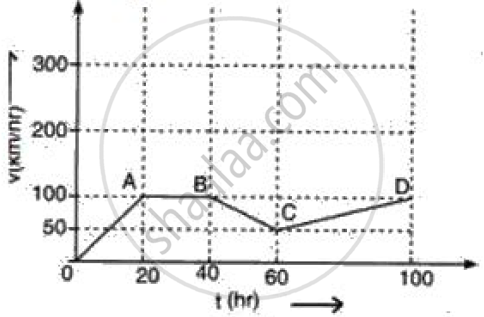Advertisements
Advertisements
प्रश्न
The speed of a car increases from 10 km/h to 64 km/h in 10 seconds. What will be its acceleration?
उत्तर
Initial velocity u = 10 km/hr. = (10 X 1000)/3600 = 8.33 ms-1.
Final velocity = 64 km/hr = (64 X 1000)/3600 = 17.77 ms-1.
Time = 10 s.
Acceleration = (v-u)/t = (17.77- 8.33)/10 = 9.44/10 = 0.94 ms-2.
APPEARS IN
संबंधित प्रश्न
What is meant by the term retardation? Name its S.I. unit.
A train moving with a velocity of 20 m s-1 is brought to rest by applying brakes in 5 s. Calculate the retardation.
When is the acceleration due to gravity positive?
Is it possible for an accelerating body to have constant speed?
Figure represents graphically the velocity of a car moving along a straight road over a period of 100 hours.
Calculate the acceleration along AB and the retardation along BC.
State whether true or false. If false, correct the statement.
Acceleration can get negative value also.
Assertion: The accelerated motion of an object may be due to change in magnitude of velocity or direction or both of them.
Reason: Acceleration can be produced only by change in magnitude of the velocity. It does not depend the direction.
What do you understand about negative acceleration?
A bus accelerating with 4ms-2 changes its speed from 60ms_1 to a certain value in 5s. The final speed is ______.
A quantity has a value of 16ms-2. It is the ______.
